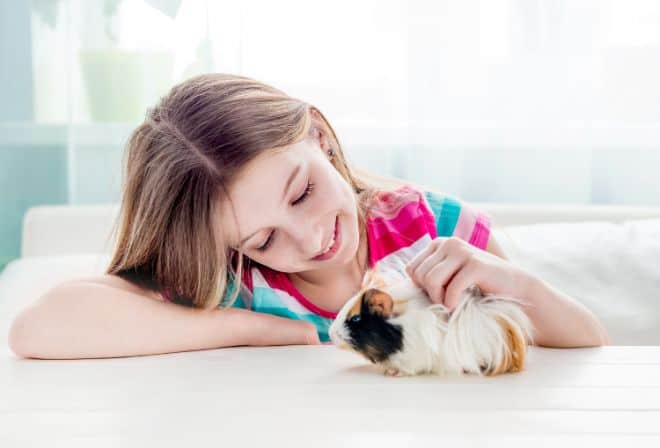Guinea pigs are adorable pets that have been around for centuries. They are known for their cute appearance, gentle nature, and funny sounds.
But have you ever wondered if they are ticklish? In this blog post, we will explore the myth of guinea pig ticklishness and answer some of the most common questions surrounding this topic.

Understanding Ticklishness in Animals
Before delving into whether guinea pigs are ticklish, we need to understand what ticklishness is in animals and what causes it.
What Causes Ticklishness in Animals?
Ticklishness is a complex phenomenon that is still not fully understood. However, it is believed to be a reflexive response to touch that involves the activation of nerves in the skin and muscles.
When we are tickled, our bodies respond by contracting and twitching in an attempt to protect ourselves from the tickling sensation.
Do All Animals Experience Ticklishness?
While ticklishness is a common trait in humans, not all animals experience it. Some animals, like reptiles, do not have the same nerve endings that mammals have, which means they do not experience the same sensations.
However, other animals, like cats and dogs, and even rats, are known to be ticklish.
How Can We Tell If an Animal Is Ticklish?
It can be difficult to tell if an animal is ticklish, as their reactions can vary. Some animals may respond by laughing or vocalizing, while others may squirm or twitch.
It is important to note that just because an animal does not respond to tickling does not mean they are not sensitive to touch.
The Guinea Pig’s Physiology and Sensitivity to Touch
Guinea pigs have a unique physiology that makes them quite sensitive to touch. They have a lot of nerve endings in their skin, which means they are more likely to react to touch than other animals.
How Do Guinea Pigs Sense Touch?
Guinea pigs sense touch through their whiskers, which are highly sensitive and can detect changes in air currents and vibrations.
They also have sensitive skin that can detect pressure and temperature changes.
Are Guinea Pigs More Sensitive to Touch Than Other Animals?
Guinea pigs are more sensitive to touch than some other animals, but not all. Cats, for example, have highly sensitive whiskers that allow them to detect even the slightest changes in their environment.
Which Parts of a Guinea Pig’s Body Are Sensitive to Touch?
Guinea pigs have sensitive skin all over their bodies, but some areas are more sensitive than others. Their feet, ears, and underbelly are particularly sensitive, and touching these areas can cause them to react.
Exploring Guinea Pigs’ Reactions to Physical Stimuli
Now that we understand more about how guinea pigs sense touch, let’s explore how they react to physical stimuli like tickling.
What Is the Guinea Pig’s Response to Tickling?
Guinea pigs may respond to tickling by squirming or twitching, but they do not typically vocalize or laugh like humans do.
Some guinea pigs may even become agitated or stressed if they are tickled too much.
Does Tickling Guinea Pigs Cause Them Any Harm?
Tickling guinea pigs should be done with caution, as it can cause them stress and anxiety. Some guinea pigs may even become aggressive if they feel threatened or uncomfortable.
It is important to read your guinea pig’s body language and understand their individual personality before attempting to tickle them.
Can Tickling Be Used as a Training Tool for Guinea Pigs?
Tickling should not be used as a training tool for guinea pigs. Instead, positive reinforcement techniques like treats and praise should be used to encourage good behavior.
Conclusion
In conclusion, while guinea pigs may react to tickling, they do not experience ticklishness in the same way that humans do.
Their sensitivity to touch makes them more likely to react to physical stimuli, but tickling should be done with caution and should not be used as a training tool.
Understanding your guinea pig’s individual personality and body language is key to ensuring their happiness and well-being.
- How Long Do American Eskimo Dogs Live? Important Factors and Care Tips - September 29, 2023
- Do American Bulldogs Need Grooming? Essential Tips and Care Guidelines - September 29, 2023
- Do Bengal Cats Enjoy Playing? Essential Tips for Keeping Them Active - September 29, 2023